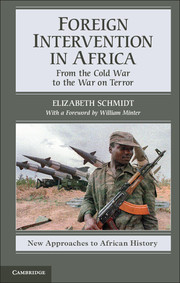Book contents
- Frontmatter
- Contents
- Illustrations
- Acknowledgments
- Foreword
- Abbreviations
- MAP 0.1. Africa, 1947. (Map by Philip Schwartzberg, Meridian Mapping, Minneapolis.)
- MAP 0.2. Africa, 2011. (Map by Philip Schwartzberg, Meridian Mapping, Minneapolis.)
- Introduction
- 1 Nationalism, Decolonization, and the Cold War, 1945–1991
- 2 Egypt and Algeria Radical Nationalism, Nonalignment, and External Intervention in North Africa, 1952–1973
- 3 The Congo Crisis, 1960–1965
- 4 War and Decolonization in Portugal's African Empire, 1961–1975
- 5 White-Minority Rule in Southern Africa, 1960–1990
- 6 Conflict in the Horn, 1952–1993
- 7 France's Private African Domain, 1947–1991
- 8 From the Cold War to the War on Terror, 1991–2010
- Conclusion
- Index
Conclusion
Published online by Cambridge University Press: 05 February 2013
- Frontmatter
- Contents
- Illustrations
- Acknowledgments
- Foreword
- Abbreviations
- MAP 0.1. Africa, 1947. (Map by Philip Schwartzberg, Meridian Mapping, Minneapolis.)
- MAP 0.2. Africa, 2011. (Map by Philip Schwartzberg, Meridian Mapping, Minneapolis.)
- Introduction
- 1 Nationalism, Decolonization, and the Cold War, 1945–1991
- 2 Egypt and Algeria Radical Nationalism, Nonalignment, and External Intervention in North Africa, 1952–1973
- 3 The Congo Crisis, 1960–1965
- 4 War and Decolonization in Portugal's African Empire, 1961–1975
- 5 White-Minority Rule in Southern Africa, 1960–1990
- 6 Conflict in the Horn, 1952–1993
- 7 France's Private African Domain, 1947–1991
- 8 From the Cold War to the War on Terror, 1991–2010
- Conclusion
- Index
Summary
This book has demonstrated that during the period of decolonization and the Cold War (1945–91) and the first two decades of its aftermath (1991–2010), foreign intervention in Africa strongly influenced the outcome of conflicts and the fate of African nations. However, foreign powers did not simply impose their will on a passive continent or use African actors as proxies for their own interests. Rather, external powers interacted in complex ways with African societies. While foreign governments took advantage of divisions within African societies to promote their own interests, African actors also used external alliances for their own ends. The scale and character of the interventions varied across time and space, reflecting both the interests and concerns of foreign powers and the regional and national contexts in which they occurred. Although most interventions during the Cold War and decolonization period were perpetrated by extracontinental powers, African nations also embroiled themselves in their neighbors’ affairs. During the period of state collapse (1991–2001), the most serious instances of foreign intervention involved intracontinental powers, which in turn implicated regional and extracontinental peacekeeping forces. The narrative of the global war on terror emerged during the first decade of the twenty-first century (2001–10), focusing on real or imagined threats from Islamist extremists in several parts of the continent. However, this period also witnessed an array of interventions that were unrelated to the war on terror, as global, continental, and regional organizations became involved in African conflicts on behalf of political and economic interests and for humanitarian and peacemaking purposes. In many instances, the boundaries between conflicting objectives were muddled.
- Type
- Chapter
- Information
- Foreign Intervention in AfricaFrom the Cold War to the War on Terror, pp. 227 - 230Publisher: Cambridge University PressPrint publication year: 2013

